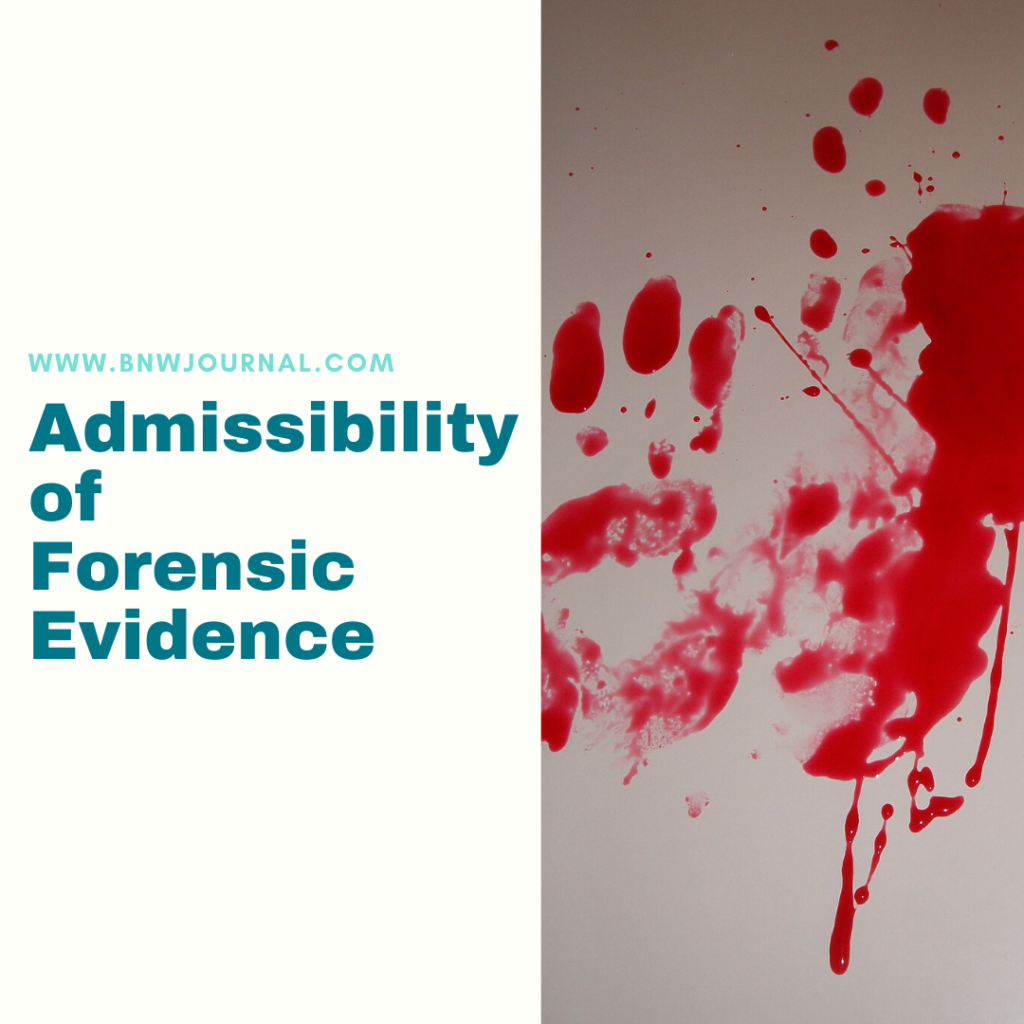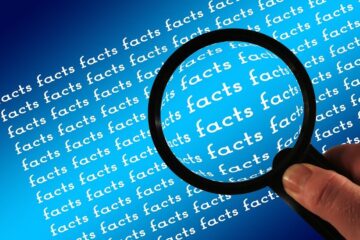![]()
Introduction
The word “Forensic” has been derived from the Latin word a “Forensis”, implying:
“belonging to the market place or forum”.

The term Forensic Science means the application of the knowledge of science for law and justice. The term includes the application of all sciences such as physics, chemistry, and biology. It may appear odd in the first instance, but almost all branches of science help in the administration of justice. Modern forensic science has different branches such as forensic psychiatry, forensic toxicology, and forensic pathology. Forensic psychiatry involved the examination of suspects in a crime to determine if they are legally sane; toxicology identifies the effects and presence of drugs and poisons in the body; and the pathologist finally evaluates the cause of death of the victims through the performance of autopsies. The court uses the evidence and information procured through all such subdivided categories of forensic science, along with ocular pieces of evidence to decide a particular case.
Hence, the author aims to analyze the admissibility of forensic evidence in the courts; while reflecting on its scope, reliability, application, and availability in Indian courts with the help of relevant provisions, landmark judgments, and profound research materials.
Relevant provisions about the admissibility of evidence in the courts
The foremost provision to take in with regards to the admissibility of evidence is in Section 45 of the Indian Evidence Act, 1872. This act refers to the admissibility of expert opinions in the course of a trial.
As per this section, the court may seek assistance and opinions of person who has special skill on foreign disciplines such as law, or of the science of art, or as to the identity of handwriting or finger impression to form its own opinion.
An expert is one, who is skilled in any particular art or trade or profession being possessed of particular knowledge concerning the same[1]. However, an expert is not a witness of fact and his evidence is really of an advisory in character.
Expert only must assist the judge on some scientific criteria for testing of independent judgment by the application of scientific criteria to the facts proved by evidence of a case[2]. Section 293 of the Code of Criminal Procedure deals with reports of certain Government scientific experts. Section 293(2) says that the Court may, if it thinks fit, summon and examine any such expert as to the subject-matter of his report.
Reliance on the Forensic Evidence in the courts, owing to its scientific nature
The author is of the opinion that the treatment of scientific evidence as primary importance over any other form of evidence is of importance; as the rate of accuracy of scientific evidence is way higher than the ocular evidence; and it hardly leaves a room for human error or negligence.
Several landmark criminal cases in India has been witnessing a trend of deteriorating police investigation supplemented with tampering of evidence due to the negligence of police officers. Losing the trail of investigation due to faulty crime scene checks; the Arushi Talwar murder case is one of the classic examples of failed investigation at the behest of police officers.
To avoid such delay and obstacles in the delivery of justice, India shall progress through increasing the level of its investigation and placing a higher reliance on medical and scientific evidence as they are worked out by the experts in that field.
The Apex Court has also given an extensive list of guidelines and situations under which the scientific evidence can be satisfactorily admitted; hence, the lower courts should also adhere to such guidelines; and accept the scientific evidence as a more reliable and recurring piece of evidence in complex criminal cases; for the speedy delivery of justice, lessening the burden on the police officers and removing ambiguity from the evidences conventionally presented.
Overview of the practical application and admissibility of Forensic Evidence in the lower courts of India
Although the apex court of India has provided an extensive list of guidance through various precedents over the scope of admissibility of forensic evidence, the lower district courts are very inconsiderate about the new modes of evidence and rely on the conventional form of investigation.
This is mainly due to the underfunded forensic department and police department of India; due to which all such tests and expert verification cannot take place at a district level. Most of the districts do not even have a proper forensic lab.
India, in terms of quality of evidence and investigation is way too behind than the other countries. Usually in the lower courts even basic medical evidence is procured with great difficulty and has the potential risk of inaccuracy, due to lack of equipment and experts.
Hence, it can be concluded that India lacks inadmissibility of forensic evidence or even accepting them as instrumental modes of aiding the investigation as far as lower courts are concerned; leaving our criminal cases at the behest of the ambiguous and negligent investigation.
Judicial approach on the pertaining subject matter
Now the field of evidence is not limited to merely a medical opinion; but the criminal law has expanded to accept forensic evidence through scientific approach and experts in various domains like ballistic reports, handwriting experts, fingerprints, lie detection tests, and so on. To discuss the scope of admissibility of each type of expert evidence the apex court has given certain rulings which are as follows:
- For Scientific evidence, the court[3] ruled that the expert opinion on fingerprints and footprints are very much reliable and can be used by the court to deduce the evidence and convict the accused if necessary.
- For Narcotic analysis and lie detection tests In Nithari Killings Case, along with many other precedents[4], the Serial killer of Noida Uttar Pradesh, went through Narcotic analysis test and revealed evidence against him as well, however, the court ruled that the evidence would not be admissible as a proof but can only aid the police in their investigation.
- In case of open firings and arms used for an offense, the court[5] has again placed high reliance on the ballistic reports to conclude the type of weapon used, the identity of the owner of the weapon, and so on.
While for specific situation and fields, the apex court has been liberal in expanding its domain by including scientific evidences, it has also ruled that no medical evidence would be accepted without an expert witness[6] testifying the same and in a case where there is a contrast between the ocular evidence and the scientific evidence, the former form of evidence would be preferred[7].
Analysis of the scope of admissibility of Narcotic Analysis test as evidence in the court through precedents
Narcotic Analysis is available in India as a method of research and finding out scientific evidence for a particular case; however, it is usually used only to substantiate the already existing evidence and is not acceptable as a sole concrete evidence. It is considered to be an infringement of the fundamental rights of the accused as through this test he is made to testify against himself. The Constitution of India has clearly stated that a person cannot be compelled to be a witness against himself[8] and therefore, any statement given during the narcoanalysis test cannot be considered evidence in the constitutional framework of the country. Studies have shown that sometimes the subject (person undergoing the test) gives false statements during the test. If the test was given evidentiary value, the police would harass innocent persons under the garb of tackling terrorism[9].
This test result may be doubtful if the test is used for confession of crimes. Suspects of crimes may, under the influence of drugs, deliberately withhold information or may give an untrue account of incident precisely.
Such tests generally don’t have legal validity as confessions made by a semi-conscious person are not admissible in court. The court may, however, grant limited admissibility after considering the circumstances under which the test was obtained.
Conclusion
It is imperative to understand the admissibility of findings, methods, and opinions as forensic medicine specialists to legal matters. Usually a test of competence is required for the admissibility of scientific evidence, as there is usually an ample number of issues that need to be addressed in case of forensic evidence.
- whether the subject matter of the expert’s opinion is appropriate to the case;
- qualification of the experts involved in procuring and validating the evidence;
- The type of information on which the expert bases his opinion;
- limitations other than the above about the type of opinion an expert can express.
However, there is a significant number of cases that mandatorily require the aid and expertise of scientific evidence and application of intelligent medical principles, owing to the complexity and nature of the case. Forensic evidence can successfully be categorized as a law providing for the statistical probability of evidence. Further, the final call and decision is based on the acumen and interpretation of the courts to use the scientific and legal principles to decide upon the credibility and reliance that is optimum to be placed in the scientific evidence and to the expert’s opinion in a particular subject matter.
References:
[1] Punjab Singh vs. State J&K LR 607: DR. V. Krishnamachari, Law of Evidence, S.gogia & company, 7th edition, 1974.
[2] State of HP. vs. Jai lal, AIR SC 3318: DR. V. Krishnamachari, Law of Evidence, S.gogia & company, 7th edition, 1999.
[3] Pritam Singh vs State of Punjab. SC 415, CriLJ 805.
[4] Selvi v. State of Karnataka. 7 SCC 263
[5] Rchhpal Singh vs State of Punjab. AIR SC 2710
[6] State of Maharashtra vs Damu Gopinath Shinde. AIR SC 1691
[7] Malappa Sidappa Alakumar vs State of Karnataka, AIR SC 2959
[8] Kriti Das, ‘Narco-Analysis: A Breakthrough in Indian Investigation’, The Viewspaper, 2009 available at www.theviewspaper.net/narco-analysis-a-breakthrough-in-indian-investigation
[9] Rojo George v. DSP, (2006) 2 KLT 197



0 Comments